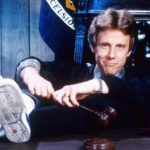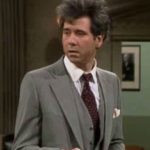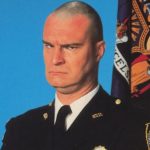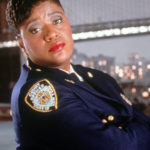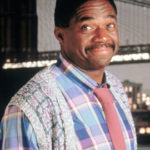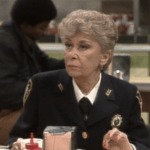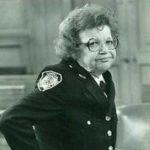NIGHT COURT
THE RIDICULOUS. THE BIZARRE. THE INSANE. ALL RISE, JUDGE HARRY T. STONE IS NOW PRESIDING.
Absolutely absurd, completely ridiculous and featuring a cast of thousands, or at least it felt that way, the world of Night Court really had no equal in the television universe.

Surrounded by shows that shovelled the moral lessons at you by the dump truck load – here’s looking at you Cosby Show and Family Ties – Night Court had no interest in making us better people by pandering to us. Instead, it made us better people by trying as hard as it could, episode after episode, to make us laugh in any way possible.
With a setting and premise that allowed the writers to bring literally anything and anyone into the courtroom, it is very nearly untouchable in terms of the range of characters that came through Harry’s court on the 18th floor of the City Courts Building in New York. And this includes a roaming box of sex toys that yes, is portrayed as an actual character in one episode. And while the entire premise of the show being centred on a 34 year old judge seems impossible, it was loosely based on true events in Los Angeles where angry outgoing mayor Sam Yorty filled all of the district’s judicial openings with unqualified people simply to annoy victorious candidate Tom Bradley. That’s petty as all hell and is the perfect seed for a show that revelled in its pettiness.
It’s hard to remember any significant parts of the show today because there were very few major story arcs. This was a show whose comedy and plot points was mostly driven by the individuals brought into court, leading to an extraordinary amount of self contained episodes. In fact, the writers should be given extra credit for coming up with the hundreds of bizarre cases and the equally bizarre defendants that came with them.
Kind of like the late night miscreants that appeared before Judge Harry and his courtroom team, the show itself was an oddball outsider. It bucked the trend of the domestic sitcoms of the time and the significance they placed on Very Serious Topics and family members learning lessons by the end of each episode. Night Court was written specifically against this common trope, deliberately avoiding heavy topics. The characters themselves, while having impressive backstories and fully fleshed out personas, did not revel in their own problems in a terribly serious manner. Or if they did it was very short lived and played up more for fun then anything else.
A show about weirdos, for weirdos and if you, like I, felt a certain sense of belonging and kinship while court was in session you’ll surely enjoy rewinding back to see just how wild Night Court could be.
when was it on
 Night Court first aired on NBC as a mid-season replacement on January 4 1984, beginning a 13 episode season that ended on May 13 of that year. After that it aired for 8 full seasons with its finale on May 31 1992 for a total of 193 (!) episodes. Originally scheduled to start as part of NBC’s fall lineup in 1984, it was pushed back over fears of lead actor Harry Anderson not having the acting chops to carry the show. After every sitcom that debuted in September had flopped, Night Court got its chance.
Night Court first aired on NBC as a mid-season replacement on January 4 1984, beginning a 13 episode season that ended on May 13 of that year. After that it aired for 8 full seasons with its finale on May 31 1992 for a total of 193 (!) episodes. Originally scheduled to start as part of NBC’s fall lineup in 1984, it was pushed back over fears of lead actor Harry Anderson not having the acting chops to carry the show. After every sitcom that debuted in September had flopped, Night Court got its chance.
It had an interesting ratings arc, starting slow, but becoming a top ten hit in seasons 4 and 5 as part of an early version of Must See TV on Thursdays alongside The Cosby Show, Cheers and Family Ties. But as per usual, the all seeing network executives did the time slot polka and its ratings slowly dropped year over year, bottoming out at 60 in its final season. Seriously though – what kind of TV grid coloured glasses do these guys wear?
what was it about
A broad workplace comedy about New York’s infamous night court wherein an extraordinary number of bizarre characters and their cases make their way through Judge Harry’s somewhat, well, different, courtroom. Absurd, subversive, insane, crude, slapstick, lowbrow, and because of this, it was just roasted by critics at the time. Sitting alongside the behemoths of the NBC lineup of the time, Cheers, The Cosby Show, and Family Ties, as Erik Adams of The A.V. Club put it, “for a few years in the 1980s, Night Court was the square peg that was also a ratings champion.”
Each episode revolved around not only the wild cases and characters that came before the court, but also the interplay of the courtroom staff and their relationships. Just as Night Court was the oddball of the television comedy lineup of the time, the real night court was, and presumably still is, the oddball of the New York city court system. And along with this oddball nature we got to see, what I would argue, is a more accurate portrayal of humanity than what was being shown before it on the fantasyland comedies of the time.
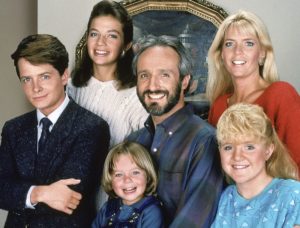 Did anyone ever really live like the Keatons? Probably in one case somewhere. But boy they must have been the most boring family on the planet. Many people – especially the people of New York City in the 80s – have a weird side, a quirky side, a misfit side. And these are the people who came out to play on Night Court.
Did anyone ever really live like the Keatons? Probably in one case somewhere. But boy they must have been the most boring family on the planet. Many people – especially the people of New York City in the 80s – have a weird side, a quirky side, a misfit side. And these are the people who came out to play on Night Court.
On Thursday nights we got our life lessons from 8 until 9, then got to loosen the tie when we went down to Cheers for a drink. But even Cheers was for the cool kids. Night Court was for the wacky kids. Before YouTube and Tumblr and Vine and Facebook it was really hard to publicly celebrate your niche weirdness. Sure, fandoms existed, but not like today where they have become the cool kids with thousands of followers. Night Court dredged up all these strange characters with their delusions and obsessions and paraded them before us one after another. And I know there were lots of people that identified more to these curio cats than anyone on any of the more placid shows. 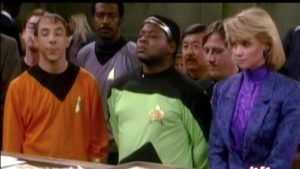 I mean, we get a case about new Star Trek fans vs old Star Trek fans. Niche fandom built right in.
I mean, we get a case about new Star Trek fans vs old Star Trek fans. Niche fandom built right in.
So what was it really about? Relationships, career arcs, family growth? Well, these existed, but were more on the periphery than we are used to in a sitcom. The usual will they or won’t they trope existed for Harry and Christine throughout their time together on the series, but never ended up together (despite it being the original intention, which had to be suddenly re-written due to a last minute renewal for a 9th season). Christine did get pregnant and married, a storyline that was necessitated by Markie Post’s real life pregnancy. She also finished her story by being elected to congress. Mac eventually went to film school to fulfill his dream of becoming a film director, but this would occur after the show had ended. Bull ended up getting abducted by aliens. Because of course he did.
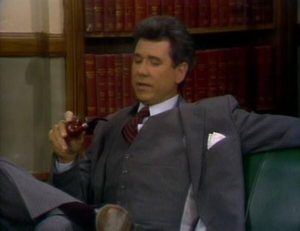 Dan by far had the biggest arc, both personally and professionally. His character was originally a very straight laced conservative lawyer. The Frasier Crane of the courtroom. Or, as Larroquette himself put it, a grown up Alex P. Keaton. It was later in the first season that the writers started his path to narcissistic debauchery which was complete by season three. A very dramatic turnaround, but one that netted Larroquette four Emmy awards. And during season 8 he starts on a path to redemption and kindness. This character covered a lot of ground.
Dan by far had the biggest arc, both personally and professionally. His character was originally a very straight laced conservative lawyer. The Frasier Crane of the courtroom. Or, as Larroquette himself put it, a grown up Alex P. Keaton. It was later in the first season that the writers started his path to narcissistic debauchery which was complete by season three. A very dramatic turnaround, but one that netted Larroquette four Emmy awards. And during season 8 he starts on a path to redemption and kindness. This character covered a lot of ground.
Dan also seems to have the most big events revolve around him. He faced disbarment, was nearly sent to Antartica with the Army Reserves, lost his life savings in an IRS audit (partially due to a gypsy curse of course), did a stint in dog court, ran (and lost miserably) for congress, ran a charity, and at the end followed Christine to Washington to declare his undying love for her. Phew.
But mostly we learned about life, love, devotion, fanaticism, kindness, and even mental health, through the cases that Harry presides over. While the situations seem absurd and in some instances even sad, it showed us that to these people, and thus to the defendants of the real night court, that this was their reality, and their life. The biggest takeaway from the show was the comedy, but it was also to show us that indeed everyone is walking their own path through life. And that’s ok.
where does it take place
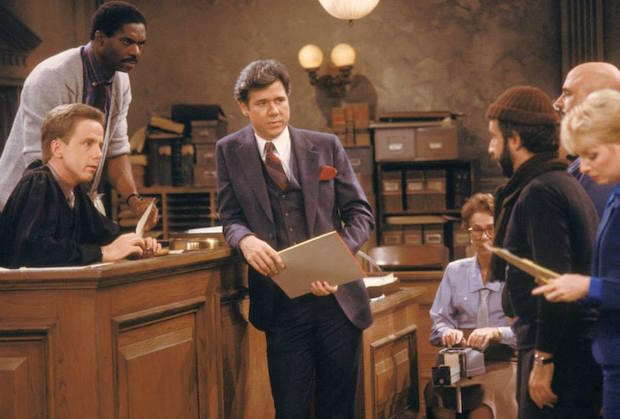
True to its name, Night Court took place in a New York City courtroom. In television there is something known as a “bottle episode” where everything on that particular episode happens on one set. Seinfeld was famous for this, particularly the episodes “The Parking Garage” and “The Chinese Restaurant,” whose bottle locations are pretty self explanatory. Night Court was the inverse of this. To leave the courtroom was rare. Almost everything that mattered across the entire series happened on this set, or just adjacent, in Harry’s chambers.
The set itself was a fairly standard, small courtroom setup. Doors at the rear, benches for the lookie-loos, judge’s bench at the front with the various court administrators at the front and to the sides. What I always noticed about the set was how dingy it looked. I’m assuming this was an intentional design considering the type of court, and type of cases they dealt with.
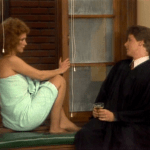 I also always thought it took place in a basement because of the dark feel. Somehow it just felt like they were in some kind of bunker. This despite there being a window in Harry’s chambers. I was young, what did I know. In reality they were supposed to be on the 18th floor of their building (which was repeatedly said during the show, yes I was a little idiot), yet the opening credits show a building were this is clearly impossible, and an elevator that only went up 12 floors. Considering how bizarre the show was I suppose this random architecture fits.
I also always thought it took place in a basement because of the dark feel. Somehow it just felt like they were in some kind of bunker. This despite there being a window in Harry’s chambers. I was young, what did I know. In reality they were supposed to be on the 18th floor of their building (which was repeatedly said during the show, yes I was a little idiot), yet the opening credits show a building were this is clearly impossible, and an elevator that only went up 12 floors. Considering how bizarre the show was I suppose this random architecture fits.
We did get to venture out into the hallway just outside the courtroom, a lá The People’s Court, and we also had some action in the elevator and at the little court newsstand and cafeteria.
Trademark Location:
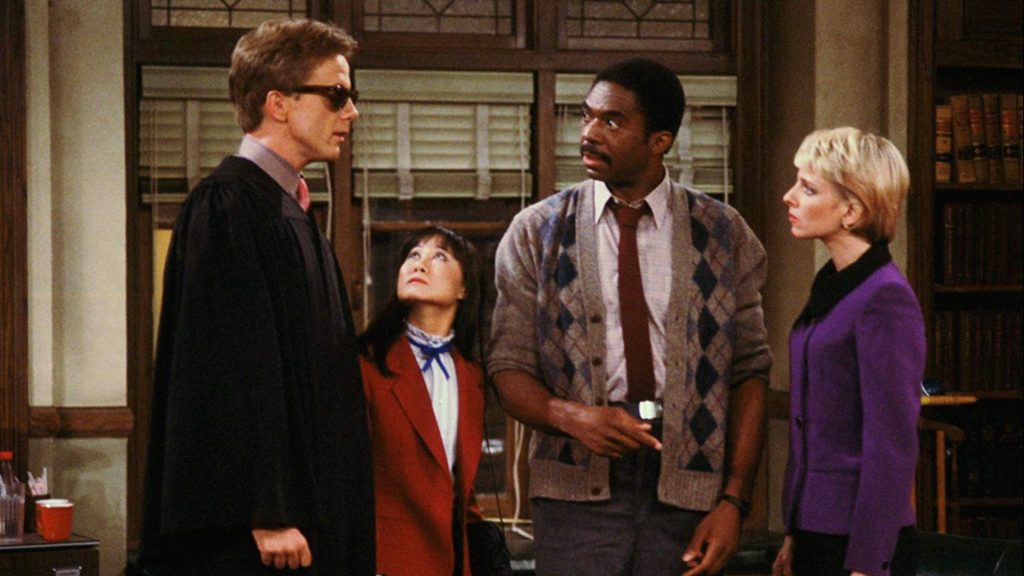
You’d think it was Harry’s bench, but I argue differently. I say it is actually Harry’s chambers. Despite this being a show that went (way) out of its way to not preach to its audience or teach any lessons, when the show occasionally broke through it’s absurdness, the chambers is where this happens. Like I said earlier, Night Court taught us that weird is ok. When it didn’t happen in the courtroom itself, it happened in the chambers.
As well, most of the important moments between the main cast members happened here. Basically, if it was a plot point that went on to affect the show in the long term, chances are this is where these played themselves out. Usually with Harry sitting perched on the front edge of his desk.
Bonus: Those little globe lights on the walls of the courtroom. You know the ones.
was the music any good
It sure is, if you remember it. Aside from Mel Tormé playing a recurring role, and the identifiable, but not generationally iconic theme song, music didn’t have much of a role in this show. And fun fact, across nine seasons the opening music never changed. Usually in this spot I go over the most memorable version of the theme music and then blather on about television executives and their bizarre compulsion to never stop toying with opening jingles. I just think NBC never cared enough about Night Court to be bothered to interfere with the music or the intro as a whole.
As for the theme itself, it’s light, funky, jazzy, and my God oh so 80s. Just the intro baseline itself was enough to perk your ears up. And I really want to say that’s a clarinet playing the lead at the beginning but sadly I suspect it’s actually a soprano sax. One day the squealy clarinet will have it’s moment on the sun on national television. It’s also notable for not having any lyrics. This is probably part of why it’s harder to recall then many other of it’s generation.
Jack Elliot wrote the music, and it should be no surprise that he was a jazz pianist by trade. When much of the sitcom world was getting, or was soon to get, the patented Jesse Frederick soft rock treatment, true to it’s outsider reputation, Night Court stuck with the jazz. Being a show about New York at night, what kind of music would you find late in a New York club? Well, probably anything, but absolutely some dirty jazz.
So many shows have a great theme song but the music is only attached to the memories of the show because it was part of the show. That sentence makes sense, trust me. With Night Court, the aesthetic of the music and the content of the show match completely. Combined with the real life footage of the streets at night the whole thing takes on a Saturday Night Live vibe. And what do we associate with SNL? NYC at night of course.
Bap bap dah dah…tick tick.
Bonus – the music was sampled heavily in the remix of the 1998 Cam’ron song “Horse & Carriage” featuring Big Pun, Charli Baltimore, Silkk the Shocker and Wyclef Jean. And you know what? It’s really really good.
what was its tone
It’s pretty clear by now that the tone of Night Court was silly and over the top boffo. The vast majority of the action was driven by absurd premises and even more absurd characters. The writers had nearly free licence to go as far as their imaginations would take them. I know I mentioned it before but, the box of sex toys that runs rampant around the courthouse terrorizing people is still one of my go-to’s.
A good comparison is Three’s Company because, while the humour of Night Court didn’t rely so much on misunderstandings as Three’s Company did, it was similarly very physical and broad. And when we did learn some life lessons – believe it, they were to be found in both shows – it was more about friendships and being yourself rather than anything family based like so so so many other sitcoms. And, those lessons were presented in more of a take it or leave it fashion rather than a beat you over the face this is how you are supposed to act dammit I’m Papa Cosby fashion.
And you want syrup and saccharine? Unless you’re pouring it over Bull’s big bald head you’d best go somewhere else in the NBC lineup to find it.
does history remember it
Has It Been Forgotten?
Not completely forgotten forgotten, but I know this isn’t a show many people think of very regularly. Ask 100 people to name a sitcom from the 80s and this will get maybe 1 or 2 votes.
How Is It Remembered?
For those who do remember it, it seems to have aged well and to be remembered very fondly. Because it stuck out from the crowd, people identified with it on a more personal level than some of the other more generic shows of the time.
Place In Pop Culture?
Not particularly. Despite being a top ten hit for a few seasons nothing really penetrated through to the overall popular zeitgeist and that is still true today. It was a niche show then, and it’s a niche show now.
Reboots And Remakes?
Just like all shows from a bygone era this one also has reboot rumours floating around it. In fact, a story in early 2020 had a confirmed reunion underway, but that is fake news. Nothing serious to see here folks. Except for an episode of 30 Rock that finally married Christine and Harry.
Would It Work Today?
It would, but I would say more in the College Humor or Between Two Ferns format. We’ve spent 4000 words talking about how this show was ahead of its time in it’s quirky individualism, and that’s exactly what today’s internet culture is all about. If it was on network television however, well, Dan would be a very different character. The man is a walking outrage machine.
my take
The one thing I remember about Night Court is that it was my show. I think my parents maybe dipped in and out of it, other people watched it to be sure, but it wasn’t a show that people talked a lot about. It almost felt like a little secret club and I compare it a lot to Kids in the Hall or Northern Exposure. Outsider shows that you stumbled across and claimed as your own. And if you found someone else that watched these shows you had in instant kinship with them.
Before the internet it was hard to find weird and subversive humour. There were a few bits and bats out there, around here there was Almost Live! out of Seattle, but for the most part you were given what the networks fed you. To have a show that wore it’s wacky right on its sleeve was a wonderfully refreshing thing for a young ‘un finding his comedic sensibility.
3 for fun
 John Larroquette basically said to stop giving him Emmys. After winning 4 straight from 1985 to 1988 he told the Television Academy to take him out of consideration for both a fear of being typecast and because he personally felt his work was not award worthy. We’ll agree to disagree on this one Mr. Larroquette.
John Larroquette basically said to stop giving him Emmys. After winning 4 straight from 1985 to 1988 he told the Television Academy to take him out of consideration for both a fear of being typecast and because he personally felt his work was not award worthy. We’ll agree to disagree on this one Mr. Larroquette.
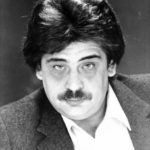 Series creator Reinhold Weege said hello to his friends through the show by naming pimps and hookers after them. If this isn’t true to the spirit of the show then nothing is.
Series creator Reinhold Weege said hello to his friends through the show by naming pimps and hookers after them. If this isn’t true to the spirit of the show then nothing is.
 Ellen Foley was cast as the public defender Billie Young in for season 2. An accomplishment in itself, except that I would say she’s much better known as the female singer on Meatloaf’s “Paradise By The Dashboard Light.” Even if you think you don’t know this song you know this song.
Ellen Foley was cast as the public defender Billie Young in for season 2. An accomplishment in itself, except that I would say she’s much better known as the female singer on Meatloaf’s “Paradise By The Dashboard Light.” Even if you think you don’t know this song you know this song.
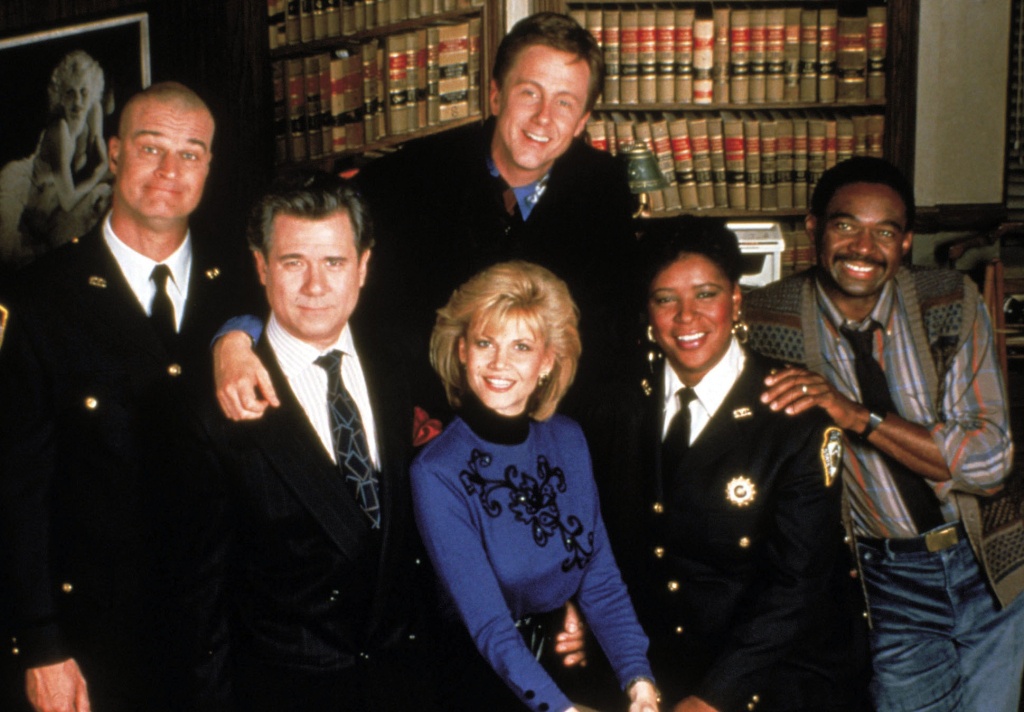
who created it
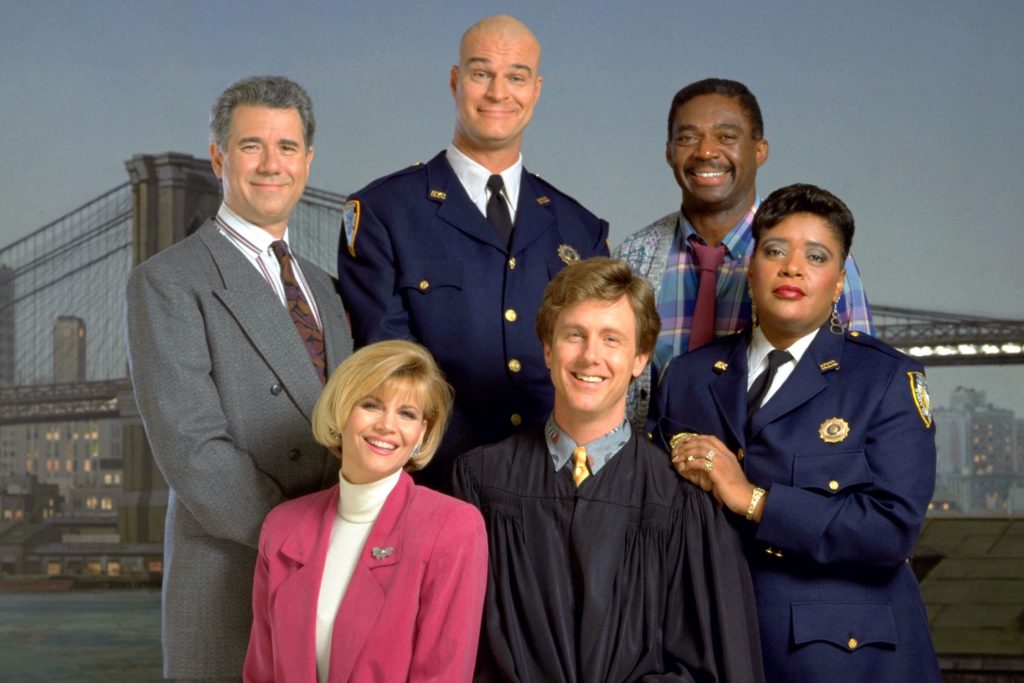
why we love it
- Because it was weeeeeeeird.
- At times it was more of a sketch show built around the players in the court room.
- It provided a welcome respite from the saccharine offerings from the networks at the time.
- Read: no Very Serious Topics, or at least very few.
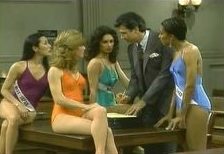
why we hate it
- There weren’t a lot of warm and fuzzies to be had here.
- No comforting living room couch, no dad giving you a reassuring speech while tucked in bed.
- A lot of times shows can be like a Snuggy, warming you with its familiar feelings. Night Court was more of a moth eaten potato sack that smelled like bad weed when you wrapped it around yourself.
- Dan was a lecherous pig.
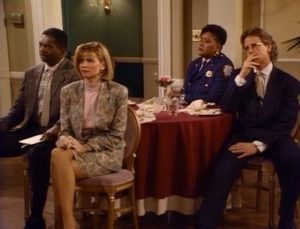
what it's best for
- Getting your freak on.
- Seeing how far they could push the censors (hint: far).
- Filling your repertoire with an amazing arsenal of one-line zings.
who was in it
Harry Anderson as Judge Harold (Harry) T. Stone
- Noted magician and son of former mental institution patients, boyfriend to Margaret (before she had to go into witness protection).
- Very young (aged 34) to be a judge and his court was often run appropriate to his age.
- Mel Tormé fan, Barry Manilow hater.
- Loved old movies, hated modern music. Ironic considering his hate for Barry Manilow.
- Once dated a witch.
- Trademark: “Fifty dollar fine and time served.” “If that is your real name.” A really bad haircut that, in nine years, never improved.
John Larroquette as Reinhold Daniel (Dan) Fielding Elmore
- Court prosecutor, dapper conservative before turning into a lecherous sex obsessed narcissist.
- Restaurant worker while had disbarment proceedings occurring, member of US Army Reserves, failed congressional candidate.
- Very status based, was embarrassed by his poor childhood, used his middle name Fielding as his last name because it sounded more lawyerly. Yet worked in a dingy New York night court for nine years.
- Held the laws and morals of the courts in the highest regard, despite all his other character flaws.
- Trademark: “Ciao baby.”
- Having a sex dungeon.
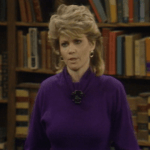 Markie Post as Christine Sullivan
Markie Post as Christine Sullivan
- Seasons 3-9, one appearance – as a different character – in season 2.
- Court public defender, noted prude, honest and naive to a fault.
- Wife, briefly, to Tony, gave birth to his son in an elevator.
- Romantic interest to Harry, sexual prey for Dan.
- Fan of the Royal family, owner of Princess Diana porcelain thimbles.
- Trademark: 27 hairstyles. Really really big blouses.
Richard Moll as Aristotle Nostradamus (Bull) Shannon
- Credit to the writers for some of these names.
- Bailiff, very bald, owner of 181 IQ, yet portrayed a fairly dim-witted simpleton.
- Sweet and gentle despite his hulking appearance, took on role of protector of Harry.
- Trademark: Slapping his hand to his forehead and saying “Ooooh-kay” when he realized he made a mistake or misunderstood something yet again.
Charles Robinson as Macintosh (Mac) Robinson
- Husband to Quon Le, court clerk (season 2-9), the straight man to the chaos around him, aspiring film director, Vietnam veteran, king of the zinger one-liners.
- Trademark: Cardigan, plaid shirt, knitted tie.
- Also – being strangely unwilling to turn on a computer.
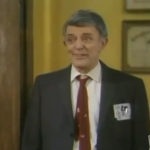 John Astin as Buddy Ryan
John Astin as Buddy Ryan
- Harry’s stepfather (seasons 3-9), eccentric, former mental hospital patient.
- Teller of long winded stories involving his time in ward.
- Reveals to Harry late in the series that he is his biological father who withheld the information to protect Harry’s job as a judge.
- Aside – I never liked this character and found him annoying.
- Trademark: “…..but I’m feeling much better now” as he gave you a massive grin assuring you he’d recovered and learned from whatever bizarre occurrence he was regaling you with.
memorable RANDOM character
Due to its format of having multiple court cases in an episode it was literally a parade of people rolling through the guest credits. For this reason it can’t possibly be just one character, or even a couple, instead the memorable random character must be this massive guest cast, many of which had small recurring parts during a season or two.
Night Court had an incredible 75 characters appear in between 3 and 17 episodes. If we expand this to include 2 episode stints the list grows to an absolutely astounding 188 characters. And you want one off’s? Well I’m not counting that because there are just an insane amount. Also, kudos to the casting directors on the show.
If you do want to view the entire list you can see it here. The only show that comes to mind that has a guest/cameo list like this behind it is Frasier. If you haven’t looked into the celebrities who called into the Frasier Crane show it is a fascinating bit of trivia reading.
Here are some of the notables that made an appearance:
- Brandon Tartikoff as Himself
- Robert Pastorelli as Lorenzo Amador
- Joyce Brothers as Herself
- Biff Wiff as Phillips, whom I am including here simply because his name is Biff Wiff
- James Avery as Judge Hopkins
- Robert Englund as Arnold Preminger
- Don Cheadle as Jack
- Teri Hatcher as Kitty
- Michael Richards as Eugene Sleighbough
- Della Reese as Aunt Ruth
- Michael Gross as Arthur Thursby
- Fran Drescher as Miriam Brody
- Lou Ferrigno as The Klondike Butcher
- Michael J. Fox as Eddie Simms
- James Cromwell as Alan
- Dick Butkus as Stanley
- Stephen Root as Mr Willard
- Pam Grier as Benet Collins
- Estelle Harris as Easy Mary
- Gilbert Gottfried as Oscar Brown
- Yakov Smirnoff as Yakov Korolenko
- Brent Spiner as Bob Wheeler
- Mel Tormé as Himself
- Wile E. Coyote as Himself
- Johnny Carson as Himself
- Character actor Jack Riley as 6 different characters, including Beepo the Clown.

